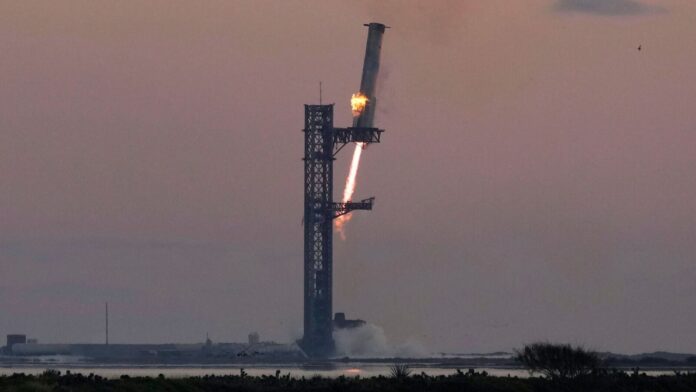A few days ago, the world appeared to have the same look when Elon Musk’s company SpaceX managed to grab a descending booster with giant pliers. I don’t know why the world reacted the way it did to the event. We have seen more marvellous things.
I just don’t get the greatness of the booster catch. The hype was similar to the time when Musk launched his red car into space and his fans were blown, as though they had not heard of an object called a satellite that could be put to better uses than an orbiting Tesla.
I do not say that capturing a rocket booster is no scientific achievement. I just say that in 2024, it is no marvel. And that it is perceived as a marvel points to a problem.
Rocket science has always had more allure than its technological substance deserved. Even in its glory days, there were sciences that required greater human brilliance than shooting off metal to space. The phrase that actually captures the meaning of “it’s no rocket science” is probably, “it’s no malaria cure.”
But it just does not sound as cool. Even the word ‘ballistic’ carries disproportionate scientific sophistication, though it merely describes gravity. (A ‘ballistic missile’ has an unguided descent while a ‘cruise missile,’ which sounds more recreational, is guided till the very end.)
The booster that Space X grabbed on its descent was about 70 metres long, or as large as a 20-storey building. The booster slowed itself down from its initial supersonic speeds before it was clutched. Boosters usually just fall into the sea.
But if they can be reused, it would significantly lower the cost of space missions. If that is the most exciting part of the booster-grab, then I am especially disappointed as an Indian because we can send a rocket up cheaper than Space X, even if our boosters just fall off.
My quarrel is that, as an innovation, the descent of a booster is not much superior to the ascent of a rocket, especially with a human crew on board that has to be taken to a precise location and brought back.
Also, even in rocketry, a booster grab is far more modest than the performance of Israel’s iron dome, which can intercept hundreds of missiles, including hypersonic ballistic missiles, the kind Iran rained on Israel a few weeks ago. Also, we landed on the Moon in 1969, and did not repeat the feat because it was not worth the expense.
The fact that in 2024 the guided descent of a rocket booster into the waiting hands of an iron structure qualifies as a great scientific spectacle of our times at once reveals and hides the fact that modern science is a big disappointment, especially to its own initial promise.
It’s not that present-day science isn’t impressive at all. For example, modern hacking is ingenious—you receive a phone call, not even answer it, and still end up with a virus that takes over your phone.
Almost everything Israel uses to defend itself is impressive technology, and much of the best warfare science today is beyond public knowledge.
But the achievements of modern science have been modest in furthering our understanding of the nature of reality (considering how much we knew, say, by 1910), and in our quality of life, especially in medical sciences, whose hype comes from their ability to prolong death instead of rejuvenating the human body.
Today, if you wish to live well, science cannot guide you in any specific way. It can only offer a broad direction, not very different from the advice of a wise old woman if you don’t count her attempts to push her high-carb sweets. In 2024, you still have to go through a process of trial and error to figure out what works for you.
Science has stagnated in areas like air travel not because it does not know how to fly you faster. We have the tech to shoot you into space from Delhi and bring you down over New York just about two hours later.
It is just that we have not found a way to do it cheaply enough for commercial application. Even so, the fact that our grandfathers and we travel at the same speed across the world is a failure of science.
Why has science disappointed? There is a defence that incremental breakthroughs in a field get difficult over time. But there is an unsung reason.
Science may have mojo, but scientific research is often tedious, even boring. Across the world, smart young people now have many options for how to lead their lives. Even in India, upper-class parents no longer pressure their children to pursue lucrative unhappy careers.
You don’t have to do something anymore just because you are very good at it; you can follow your ‘passion,’ which is often something in the arts.
As a result, some people who might have been great engineers may be making terrible but honest movies, or those who would have been marvellous biologists might be working on the best way to compress a video file.
You could argue that there are enough people in the world, and even if some opt out of the tedious aspects of science, there are still plenty of others eager to pursue them. However, extraordinary breakthroughs typically come not from systems, but from the ingenious insights of extraordinary individuals.
I worry that the scientist capable of a breakthrough that could vastly improve my quality of life when I’m 90 might be working at SpaceX, figuring out how to catch a rocket booster instead.
#Manu #Joseph #spectacle #SpaceXs #rocket #catch #science #failed
